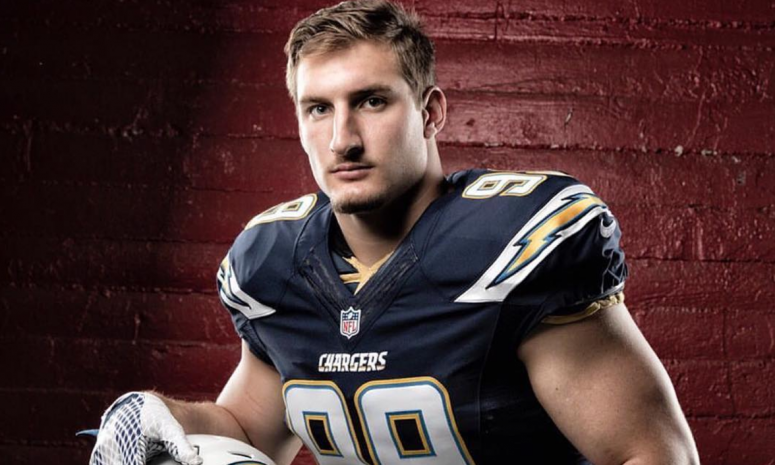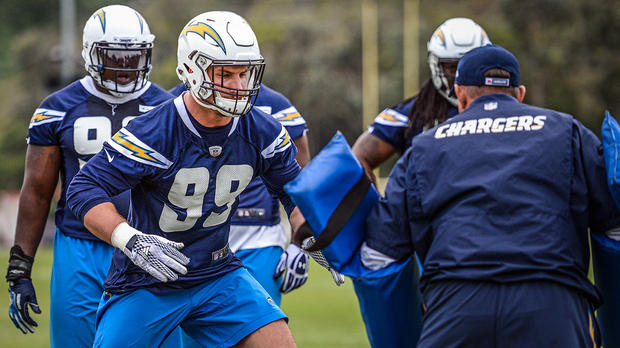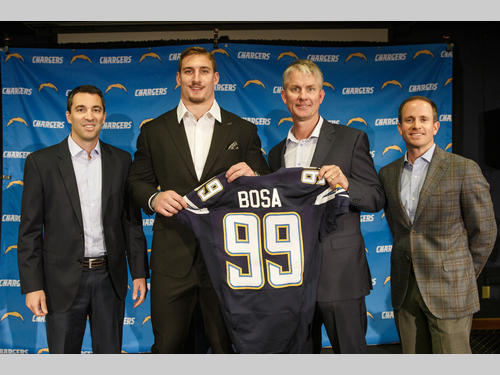The Chargers & The Joey Bosa Stalemate


The days leading up to the draft were filled with mystery for San Diego Chargers fans, as speculation ran rampant over which player the team would select with the No. 3 overall pick.
Perhaps Jalen Ramsey, considered by some analysts to be the best defensive player available. Or maybe they would seek to stabilize an oft-injured line by selecting Ole Miss offensive tackle Laremy Tunsil – whose rapid fall in the draft after a video of him smoking marijuana with a gas mask was posted to Instagram – likely came after the Chargers had made their decision to go in a different direction.
It seems that, even before Gas Maskgate, the Bolts had decided to take Joey Bosa, the outside linebacker and defensive end hybrid from Ohio State, whose family tree – he is the son of a former NFL player and the great-grandson of one of Al Capone’s bodyguards – is almost as compelling as the prospect of him beefing up San Diego’s beleaguered front seven.
In deciding to take Bosa over other attractive draft prospects, the Chargers were able to conceal their intentions – though the team had initially rated Bosa atop their board in September, months before the draft and the ensuing shuffling of prospect rankings and mock draft projections.
The team was able to conceal their plan so well that many NFL media insiders connected the Chargers to the aforementioned prospects, as well as a few more.
The organization can clearly minimize the information it provides to reporters – when it wants to.
However, in negotiations with Bosa, which have dragged on for months and fueled speculation and concern among industry insiders and fans alike, the team has taken a drastically different approach.
After months of negotiating largely behind closed doors, the Chargers released a statement on the contract talks, spelling out the demands supposedly made by Bosa’s camp, such as requesting more money before Jan. 1 than any other first rounder, besides No. 2 overall pick Carson Wentz.
Aided by public relations strategist Mark Fabiani, who has served as special counsel to the Chargers for the past 15 years – in addition to providing damage control for Bill Clinton during the fallout from the Monica Lewinsky scandal – the team has demonstrated an ability and willingness to use the media to advance its agenda.
Bosa’s side is not without blame either – somebody had to be feeding reporters updates on the contract talks, which seemed to focus on bonus money being paid out before Jan., and a dispute over offset language – a contract term that states that guaranteed money owed to a player upon his release will be offset by money he will potentially receive from his next team – portraying Team President Dean Spanos and the Chargers as awfully extreme in their negotiating disposition.
The statement from the Chargers corroborated the issues being negotiated, but painted a drastically different picture of which party was in fact being “greedy.”
Chargers fans seem eager to assign blame to either the team or Bosa’s camp, with the team’s statement clearly steering fan sentiment to the Bolts’ side – despite the animosity sparked by Fabiani’s rhetoric over stadium talks and continued hints of an impending move to Los Angeles.
So who’s at fault, exactly?

Both sides.
While fans may point the finger more at Bosa or the team, most people analyzing the situation from a rational perspective should be able to see just how minor and petty these negotiations have been from the beginning.
Bosa’s not requesting more money, and the Chargers aren’t necessarily departing from their traditional approach to signing draft picks.
Both sides are, however, using the media – whether openly, or behind closed doors – to sway public opinion and intensify the pressure on their opposition.
In doing so, the sides are creating an adversarial dynamic that could ultimately negatively impact the team in its quest to reach – and hopefully win, a Super Bowl before quarterback Philip Rivers retires.
Before you assign blame, or accept the rhetoric of one side or the other, recognize that both parties are wrong and neither side seems willing to relent, which is only hurting the team and the championship-starved fan base.
This ongoing drama may also have ramifications for the vote on Prop. C, which will require widespread public support and engagement – things that have been difficult to come by in the past.
At this point, the sides to negotiate face-to-face, not via press releases and public relations spin.
Journalist, Padres fan, beach enjoyer. I enjoy most sports, avidly follow politics and am a San Diego native. San Francisco State graduate. Go Gators!